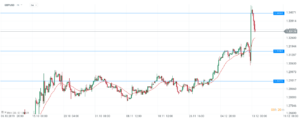31 January 2020 of the year Britain is saying goodbye to the European Union
Three years ago, Great Britain decided to start the procedure of leaving the Community. The first information that reached the market caused a large, downward volatility. The current situation, in which we officially got to know the date of UK exit from the Union, caused the opposite reaction. At the same time, one fundamental question arises, what will the "post -xre" reality look like when the euphoria has already subsided?
Be sure to read: Brexit: The date has been moved to January 31. But will it change anything?
Enthusiasm, but only for a moment?
The largely positive reaction of the markets to this news probably concerned the end of this topic. The end of Brexit, exit from the Union, new deadlines for leaving the community have become extremely (this year) tiring for the markets. The very fact of attaching this event gave a lot of breath to investors, which was reflected in optimistic moods. The very fact that in recent days the pound has been strengthening intensively against the dollar was a positive signal in the context of Brexit. It has been speculated that the appreciation of GBP to USD will be a sign that the exit from the EU will take place only when signing the agreement, not the no deal scenario.
Now the world of investors will have to adapt to reality all the effects of Brexit. The general assumption regarding the agreement (if it will be concluded - good, no deal - bad) has somewhat overshadowed all negative economic consequences related to the UK's exit from the EU.
UK elections and more duties
British elections yesterday attracted the attention of investors. It seems that this week largely belongs to the UK and it is the events in this country that define the general sentiment. Looking more broadly at geopolitical events as early as December 15, according to Trump's announcements, China is to be charged with tariffs. For now, we have not learned any information in this topic about the possible abolition or postponing them in time. Two scenarios follow from market reports. The first speaks of reducing them by 50%, provided that China increases purchases in the area of agricultural products. The second assumes the complete abolition of tariffs. Which one will work? Given the unpredictability of President Donald Trump's decision, it's hard to speculate on this topic.






















![Forex Club – Tax 9 – Settle tax on a foreign broker [Download the Application] Forex Club - Tax 9](https://forexclub.pl/wp-content/uploads/2024/02/Forex-Club-Podatek-9-184x120.jpg?v=1709046278)
![Trading View platform – solutions tailored to the needs of traders [Review] trading view review](https://forexclub.pl/wp-content/uploads/2024/03/trading-view-recenzja-184x120.jpg?v=1709558918)
![How to connect your FP Markets account to the Trading View platform [Guide] fp markets trading view](https://forexclub.pl/wp-content/uploads/2024/02/fp-markets-trading-view-184x120.jpg?v=1708677291)
![How to invest in ChatGPT and AI? Stocks and ETFs [Guide] how to invest in chatgpt and artificial intelligence](https://forexclub.pl/wp-content/uploads/2023/02/jak-inwestowac-w-chatgpt-i-sztuczna-inteligencje-184x120.jpg?v=1676364263)


![WeWork – the anatomy of the collapse of a company valued at $47 billion [WeWork, part II] wework bankruptcy story](https://forexclub.pl/wp-content/uploads/2024/04/wework-bankructwo-historia-184x120.jpg?v=1711729561)
![Adam Neumann – the man who screwed up Softbank [WeWork, part AND] adam neumann wework](https://forexclub.pl/wp-content/uploads/2024/04/adam-neumann-wework-184x120.jpg?v=1711728724)





![How to transfer shares to another brokerage office [Procedure description] how to transfer shares to another brokerage house](https://forexclub.pl/wp-content/uploads/2024/03/jak-przeniesc-akcje-do-innego-biura-maklerskiego-184x120.jpg?v=1709556924)

![The most common mistakes of a beginner trader - Mr Yogi [VIDEO] Scalping - The most common mistakes of a beginner trader - VIDEO](https://forexclub.pl/wp-content/uploads/2024/03/Scalping-Najczestsze-bledy-poczatkujacego-tradera-VIDEO-184x120.jpg?v=1711601376)
![Learning patience: No position is also a position - Mr Yogi [VIDEO] Scalping - Learning patience - No position is also a position - VIDEO](https://forexclub.pl/wp-content/uploads/2024/03/Scalping-Nauka-cierpliwosci-Brak-pozycji-to-tez-pozycja-VIDEO-184x120.jpg?v=1710999249)
![When to exit a position and how to minimize losses - Mr Yogi [VIDEO] Scalping - When to exit a position and how to minimize losses - VIDEO](https://forexclub.pl/wp-content/uploads/2024/03/Scalping-Kiedy-wyjsc-z-pozycji-i-jak-minimalizowac-straty-VIDEO-184x120.jpg?v=1710336731)



















